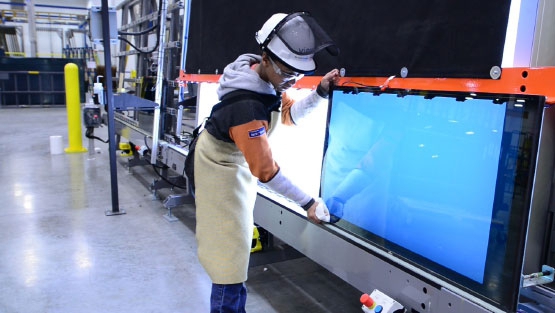Earth Day: Immigrant Contributions to Clean Tech in America
Date: April 22, 2016
Today is Earth Day, a globally celebrated movement for education, action, and change around environmental issues that began in 1970. Like Elon Musk, many immigrants have contributed to building a clean and green future in the United States by creating many environmentally focused start-ups here. Here are a few examples of how energy-conscious immigrants used their entrepreneurial spirit to found companies that are helping to tackle today’s environmental challenges.
Dr. K.R. Sridhar, Bloom Energy:
K.R. Sridhar was born in India but moved to the United States to complete an M.S. and Ph.D. in nuclear engineering at the University of Illinois. While working under the NASA Mars program to create a technology to convert Martian atmospheric gases to oxygen for propulsion and life support, Sridhar and his team designed a fuel cell that could generate air and fuel from solar panel electricity. In 2001, Sridhar founded the clean-tech company Bloom Energy with the mission “to make clean, reliable energy affordable for everyone on earth,” while continuing to develop fuel cell technology. Bloom’s Energy Servers, which are newly imagined power generators, have eliminated millions of pounds of CO2 from the environment and generated millions of kilowatt-hours of electricity more efficiently.

(Photo via Bloom Energy)
Paul Nguyen, View Dynamic Glass:
Paul Nguyen, an expert who had worked in the field of electrochromism at MIT, founded View Dynamic Glass in 2006. View Dynamic Glass employs around 150 people and is known for its “intelligent window” technology. The company’s glass windows have five thin layers of metal oxide that allow the windows to change tint electronically depending on a variety of factors, including a building’s heat load, the building’s orientation, time of day, and the cloud cover present. While reducing unwanted heat and glare, View Dynamic Glass windows still allow those inside the building to enjoy the view.

(Photo via View Dynamic Glass)
Unfortunately, not every immigrant-founded clean-tech startup has a happy ending. The United States currently lacks a designated entrepreneur visa, making it difficult for immigrant entrepreneurs to keep their companies in America. Love Sarin’s Banyan Environmental, a company that developed green technology to combat mercury pollution and exposure, is just one example of a missed opportunity for America.
Love Sarin, Banyan Environmental:
Love Sarin, a former student at Brown University, came to Rhode Island eager to contribute. In 2004, Sarin—a native of Jaipur, India—moved to America to begin working toward a PhD in chemical engineering. Within a few years, he hit upon a discovery while doing cancer research: He discovered that the element Selenium had properties that indicated it could neutralize harmful mercury in the body. Soon, with Sarin’s urging, his team began testing the compound outside of the human body and discovered it was effective in making mercury vapors less harmful. “It was really a different route than many researchers had taken before,” Sarin says. And it paid off: Brown officials found the technology so promising they decided to apply for a patent for the discoveries in 2008.
Energized, Sarin decided to turn his work into an environmental technology startup. In 2009, shortly after graduating, he and an advisor started Providence-based Banyan Environmental to commercialize their work. Sarin and his team envisioned a future where the technology could be used to make coal-fired power plants less harmful to consumers, potentially saving millions in annual healthcare costs. They also began looking into making specialized kits that would make it easier to clean up broken fluorescent light bulbs—a health risk in places as varied as workplaces and the landfills where unrecycled bulbs seep chemicals into the ground. “We were very excited about the work and our potential for growth,” Sarin says. And he wasn’t alone in that assessment. In its first two years, Banyan won two competitive grants from the National Science Foundation, as well as from the Rhode Island Science and Technology Advisory Council, a government-funded group designed to promote research and development in the state.
Unfortunately all of the company’s accomplishments didn’t solve Sarin’s immigration situation. Immediately after graduation, Sarin at first was only able to stay in the U.S. thanks to Optional Practical Training (OPT), which allows foreign-born graduates to earn hands-on experience relevant to their fields. As he neared the end of his OPT period, Sarin worried that he didn’t have many options ahead of him—especially since, as an Indian native, he would face a particularly long wait to get the green card he would need to settle in the United States permanently.
So, he spent $6,500 on legal fees to apply for a special green card reserved for immigrants with “extraordinary ability” in their fields. Although he knew the category had tough acceptance standards, lawyers told Sarin the visa was within his reach. In October 2011, however, Sarin’s application was rejected. “It was shocking and frustrating,” Sarin says. After spending seven years—the bulk of his adult life—in America, Sarin says trying to find a new home was particularly difficult and being forced to leave was particularly tough. “I had put so much time into my business, it was difficult for me to even think about doing anything else,” he says.
In February 2012, Sarin returned to India, shuttering Banyan Environmental, a firm that at one point had had three full-time employees and provided work to local contract staff like accountants and legal advisors in the state. Today, Sarin is still living in India and is “unable to revive Banyan Environmental due to…an absence of any provision of a visa for startup founders.” Sarin laments, “The immigration system comes with too many conditions that really confine what you can do and limit your ability to succeed.”
Immigrants are historically an entrepreneurial group: In 2010, for example, while immigrants comprised just 13 percent of the total U.S. population, they were more than twice as likely as native-born citizens to start new businesses. In that same year, immigrant entrepreneurs founded 28 percent all new U.S. companies. While Earth Day is a time to focus on our planet and its future, it’s also a time to call for continued innovation in the clean-tech space—and reforming our immigration system plays an important role in moving our clean-tech economy forward.
